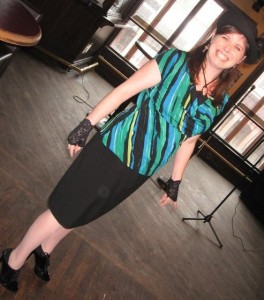This is one of those “you should” blogs that, if you know me, you know I generally hate. But I’m going to do it anyway because I’m willing to take the heat for being a hypocrite for a topic I believe is worth the sacrifice. So here goes, and it’s a bit of a daisy chain, so bear with me.
If you’re a new writer, with at least a handful of published short stories to your name or even a novel or two, then you should give serious consideration to working the convention circuit.
Back in July of 2009, I got laid off from an IT gig and decided to chase a writing career. The first thing I did was write some short stories and submit them. I also wrote a novel—the less-than-well-known Chemical Burn. Over the past four years, these efforts have borne fruit. However, if they were all I accomplished in that time, the odds are I wouldn’t be writing this blog right now for the simple reason that the folks at The Fictorians wouldn’t know who I am.
Let me explain.
In October of 2009, I attended MileHiCon, a local and well-established genre and writing convention with a strong author-track. As a result of my participation, a number of wheels were set in motion. MileHiCon is where I met Kronda Seibert and the “heart” of the local steampunk population. As a result of that meeting, I was able to write three episodes of a steampunk Internet radio show and laid the foundation for the Penny Dread Tales anthology series. I wouldn’t be writing steampunk if it weren’t for that convention.
At MileHiCon I also met Sara Megibow of the Nelson Literary Agency (which had benefits later) as well as David Boop who has introduced me to much of the Front Range writing community in one way or another. This also led to my involvement with the Broadway Book Mall.
At a convention in 2010 I met Peter J. Wacks, which opened the door to a contract for Steampelstiltskin with Fairy Punk Studios and laid the groundwork for a relationship with an international best-selling author (more on that later). I also started picking up a fan-base and found a home with the steampunk community. As a result of that, I established a recurring attendance invite with AnomalyCon and locked in “premiering” each new Penny Dread Tales (PDT) anthology at the convention. PDT has now become a staple at the con, with a growing list of “bigger-name” contributors as a result of its growing exposure. It was in this cycle of cons that I also met Guy De Marco for the first time, and that relationship opened up even more doors.
2011 was more of the same, and in 2012, I extended my reach a little and—thanks to Guy—hit OsFest in Omaha Nebraska. That’s where I met Travis Heermann. It was also in the 2012 con season that I met Angie Hodapp (also of the Nelson Literary Agency), and that opened doors to making a proposal to the Rocky Mountain Fiction Writers Board of Directors as well as teaching a seminar on writing action scenes (with Travis Heermann) at the Colorado Gold Conference this year.
2013 saw my reach deepen into the writing community. I’ve met writers, agents and publishers. I’ve got a growing list of contacts, fans, and even editors asking for my work. My relationship with Angie Hodapp and Sara Megibow over at the Nelson Agency opened the door for me to submit a query directly to Sara, and while she didn’t accept that manuscript, the door is open for me to submit directly to her when I finish my next manuscript.
On top of it all, at CoSine in Colorado Springs this year, I met for the first time Kevin J. Anderson. You may know that name. As a result, I now do book designs and eBook conversions for Word Fire Press, and as a result of that chain of events, I’ve been able to work on books by authors like Frank Herbert, Brian Herbert, Kevin J. Anderson and, coming soon, Alan Drury. I even did a WordFire Press version of the eBook for Clockwork Angels. My work with Anderson also got me into Superstars, which led to me being invited to become a Fictorian.
The daisy chain goes on and on, so what’s the message here?
That if you’re planning a career in the writing biz, you should start meeting, greeting, and carousing with people in the writing biz. That’s how you make contacts. It’s how you open doors. That’s how you create opportunities for your writing projects.
Most people think the writing business is all about getting “picked up”… about writing a manuscript in solitude, submitting a query, and finding out six months later that you’ve been offered a contract by an agent or even one of the “Big 5.” I won’t deny that this method works… but you’d have as much a chance trying to get struck by lightning in a thunderstorm.
The odds are against you, so how do you up the odds?
You hit the convention circuit, plain and simple.
Q

